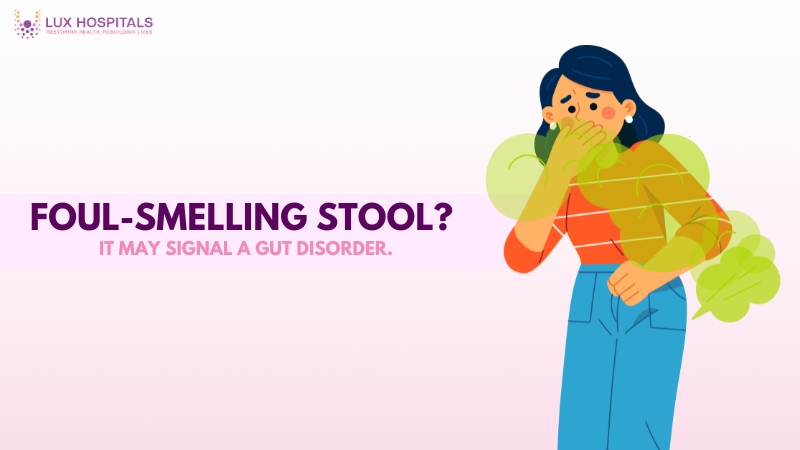Foul-Smelling Stools: Is It a Sign of a Digestive Disorder?

Bowel movements that smell bad happen to everyone occasionally. But persistent foul-smelling feces could be more than just a food problem. They may indicate underlying digestive issues that need to be treated by a doctor. This article will review the potential reasons for foul-smelling stools, when to be concerned about them, and how to address them.
What Are Foul-Smelling Stools?
Foul-smelling stools refer to bowel movements with a powerful, offensive odor. This odor often results from undigested food, infections, or an imbalance in the gut. Although stool smells vary with diet, the persistent foul odor could indicate a deeper health problem.
Top Causes of Foul-Smelling Stools: From Diet to Digestive Disorders
Foul-smelling stools can result from something as simple as a dietary choice or as complex as a chronic digestive disorder. Understanding these causes helps identify when the smell is harmless and when it signals a more serious underlying issue.
Common Dietary Causes of Foul-Smelling Stools
Several foods and drinks can lead to foul-smelling stools, including:
- High-protein diets (especially red meat)
- Dairy products in lactose-intolerant individuals
- Alcohol or caffeine in excess
- Sulfur-rich foods like broccoli, cabbage, and garlic
These dietary triggers are generally harmless and can be managed with moderation or elimination.
Malabsorption Disorders
One of the leading medical causes of foul-smelling stools is malabsorption, when your digestive system can’t absorb nutrients. This leads to fatty, oily, and extremely pungent stools. Common conditions include
- An immunological response to gluten in celiac disease harms the small intestine lining.
- Lactose intolerance: The body can’t digest lactose, leading to fermentation and odor.
- Chronic pancreatitis: Lack of digestive enzymes results in poorly digested food.
Infections in the Digestive Tract
Gastrointestinal infections from bacteria, viruses, or parasites can also produce foul-smelling stools. Symptoms may include diarrhea, cramping, fever, and nausea. Common culprits include:
- Giardiasis: A parasitic infection often contracted from contaminated water.
- Clostridium difficile: A bacterial infection that causes smelly diarrhea and is often linked to antibiotic use.
- E. coli and Salmonella: Foodborne pathogens causing inflammation and odor.
Inflammatory Bowel Diseases (IBD)
Conditions like Crohn’s disease and ulcerative colitis fall under IBD and can trigger foul-smelling stools. Regular digestion is hampered by gastrointestinal tract inflammation, which results in mucus, blood, and an unpleasant odor in the stools. Long-term care is frequently necessary for some conditions.
Liver and Gallbladder Disorders
Issues with bile production or flow, such as liver disease or gallstones, can result in pale and foul-smelling stools. Bile is essential for digesting fats; its absence produces fatty stools with a pungent smell. A yellowish or clay-colored stool often accompanies such conditions.
Cystic Fibrosis and Foul-Smelling Stools
Thick mucus in cystic fibrosis patients obstructs the pancreas from releasing enzymes, causing foul-smelling stools. This condition is usually identified in youngsters, while it can also affect adults. Weight loss, frequent lung infections, and stunted growth are some of the symptoms.
Medications and Antibiotics
Because they change the gut flora, several medications, especially antibiotics, can induce foul-smelling feces. Long-term use may eradicate beneficial bacteria, making room for dangerous ones to proliferate. Dysbiosis, the term for this imbalance, can change the consistency and smell of stools.
Treatment Options
Treatment depends on the underlying cause of foul-smelling stools:
- Dietary changes for food intolerances
- Gluten-free diet for celiac disease
- Enzyme replacement therapy for pancreatic issues
- Antibiotics or antiparasitic medications for infections
- Anti-inflammatory drugs for IBD
Managing the primary condition often resolves the smell and other symptoms.
Lifestyle Tips to Prevent Foul-Smelling Stools
Make these lifestyle changes to reduce the chance of having foul-smelling feces:
- Consume a well-rounded, high-fiber diet.
- Eat fewer processed, spicy, or greasy foods.
- Drink plenty of water.
- Steer clear of too much caffeine or alcohol.
- Probiotics can help you keep your gut healthy.
Healthy habits support digestion and naturally minimize stool odor.
When to See a Doctor?
You should consult a doctor if foul-smelling stools:
- Persist for more than a week
- They are accompanied by fever, exhaustion, or weight loss.
- Contains mucus or blood.
- Do you float in the toilet, or are you oily?
Symptoms that are severe or persistent should be taken seriously, since they might be a sign of a major intestinal problem.
Conclusion
Usually, occasional foul-smelling stools are not a cause for alarm, particularly after a substantial or spicy meal. It could be time to look into this further, though, if the issue continues or is accompanied by additional symptoms. Long-term digestive issues can be avoided by being aware of your body and getting medical assistance.
Frequently Asked Questions
Diet, illnesses, or digestive issues can all cause foul-smelling feces. Let's assume the odor persists, typically accompanied by other symptoms like diarrhea or weight loss. If so, there may be a serious problem. Consulting a medical expert is essential for a diagnosis.
In rare cases, gastrointestinal cancers may be connected to foul-smelling feces, especially if they are accompanied by lethargy, blood, or weight loss. But more frequent culprits are nutrition, malabsorption, or illness. Avoid making long-term bowel habit changes because early detection is crucial.
Infections like Giardiasis, Clostridium difficile, or Salmonella can lead to foul-smelling stools. These infections disturb normal digestion and result in gas, cramps, and smelly diarrhea. Most require medical treatment with antibiotics or antiparasitic drugs.
Yes, probiotics can improve gut health and reduce foul-smelling stools caused by dysbiosis or antibiotic use. They help restore the balance of good bacteria in the digestive tract. Regular use may prevent recurrence and support overall digestion.
For example, the odor may be oily, persistent, or accompanied by symptoms such as fatigue, discomfort, or weight loss. If so, it could indicate a serious digestive illness. You should not ignore these signs. Medical evaluation and testing can help determine the cause.




















